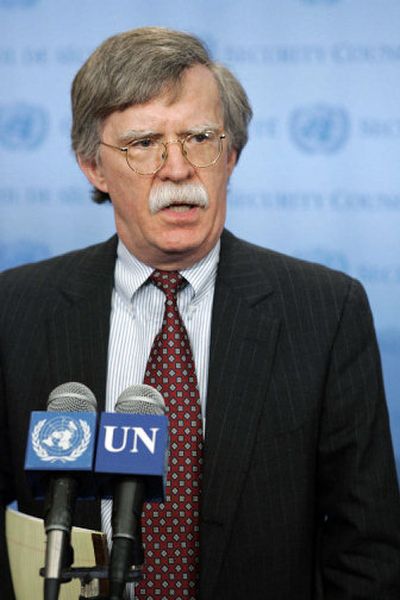U.N. closer to Iran showdown

UNITED NATIONS – The U.N. nuclear watchdog agency said Friday that Iran has continued to defy a Security Council call for a freeze on its efforts to enrich uranium, setting up a showdown between the international community and the Islamic republic.
The Security Council will meet Wednesday to begin consideration of a resolution legally requiring Iran to halt enrichment activities that also could be used to make bomb-grade uranium, and to address long-unanswered questions about the possible military applications of its nuclear program. The measure would be the next step in a diplomatic path leading to possible sanctions against Iran or its leaders.
Iranian President Mahmoud Ahmadinejad told a rally in northwest Iran on Friday that the country had the right to pursue nuclear technology and that its leader did “not give a damn” about future Security Council resolutions restricting its nuclear activities.
Iran is sticking to its stance that it has the legal right to develop nuclear know-how under the Non-proliferation Treaty. Iran’s intransigence has made other countries, especially the United States, suspicious that its history of covert nuclear development and refusal to cooperate with the U.N.’s International Atomic Energy Agency means it is pursuing nuclear weapons.
The IAEA’s report Friday did not suggest that Iran was trying to develop nuclear weapons, but said that Iran’s lack of cooperation made it increasingly difficult for inspectors to assess whether it had a covert military program.
The report said that in a 30-day grace period after the Security Council asked it to suspend enrichment, Iran forged ahead with plans to build a 164-centrifuge cascade and successfully enriched uranium to 3.6 percent, the level needed for nuclear power plants but far lower than the 80 percent to 90 percent necessary for bomb-grade fuel.
The IAEA confirmed Iran’s claims that it is in the process of building two more cascades of 164 centrifuges, which would expand its enrichment capability and demonstrate that it is on its way to mastering a key component of the enrichment process. However, nuclear experts say that Iran is still years away from producing enough highly enriched uranium for use in a weapon.
The eight-page report also said that Iran failed to address questions about the history and scope of its centrifuge program, or to clarify claims by Ahmadinejad last week that Iran was conducting research on P-2 centrifuges, a type that enriches uranium four times faster than the P-1 version it is now using.
The report concluded that because of those gaps, “including the role of the military in Iran’s nuclear program, the agency is unable to make progress in its efforts to provide assurance about the absence of undeclared nuclear material and activities in Iran.”
Iran sent a letter to the IAEA staff on Thursday, the eve of the report’s publication, saying that it would deliver a timetable to answer questions within three weeks. But the letter also contained a veiled threat, saying that it would only continue to cooperate with the agency’s regular inspections if the issue did not go to the Security Council.
The IAEA responded sharply, saying it would not accept conditions placed on its systematic checks of nuclear power plants and material under IAEA safeguards.
The United States is leading a push in the Security Council to pass a resolution legally obliging Iran to halt all nuclear research and development, a move that Russia and China have been resisting. Those two permanent members of the Security Council may ultimately allow the resolution to pass if they are persuaded it won’t by itself open the door to sanctions or military action.
“We would give Iran a short time to come into compliance,” said U.S. Ambassador John R. Bolton. “Then, if Iran doesn’t come into compliance, we would consider what the next steps would be … likely targeted sanctions,” aimed at Iranian officials, not the people or the oil industry.
President Bush told reporters shortly after the release of the report that the world is ready to ratchet up pressure on Iran.